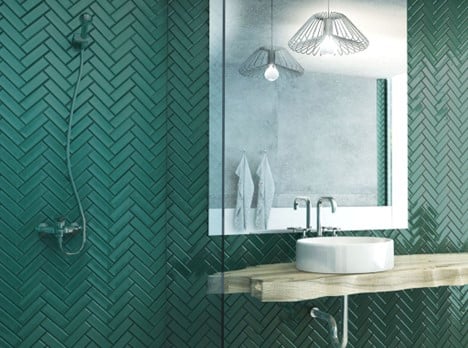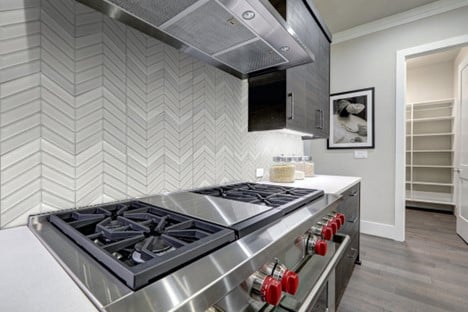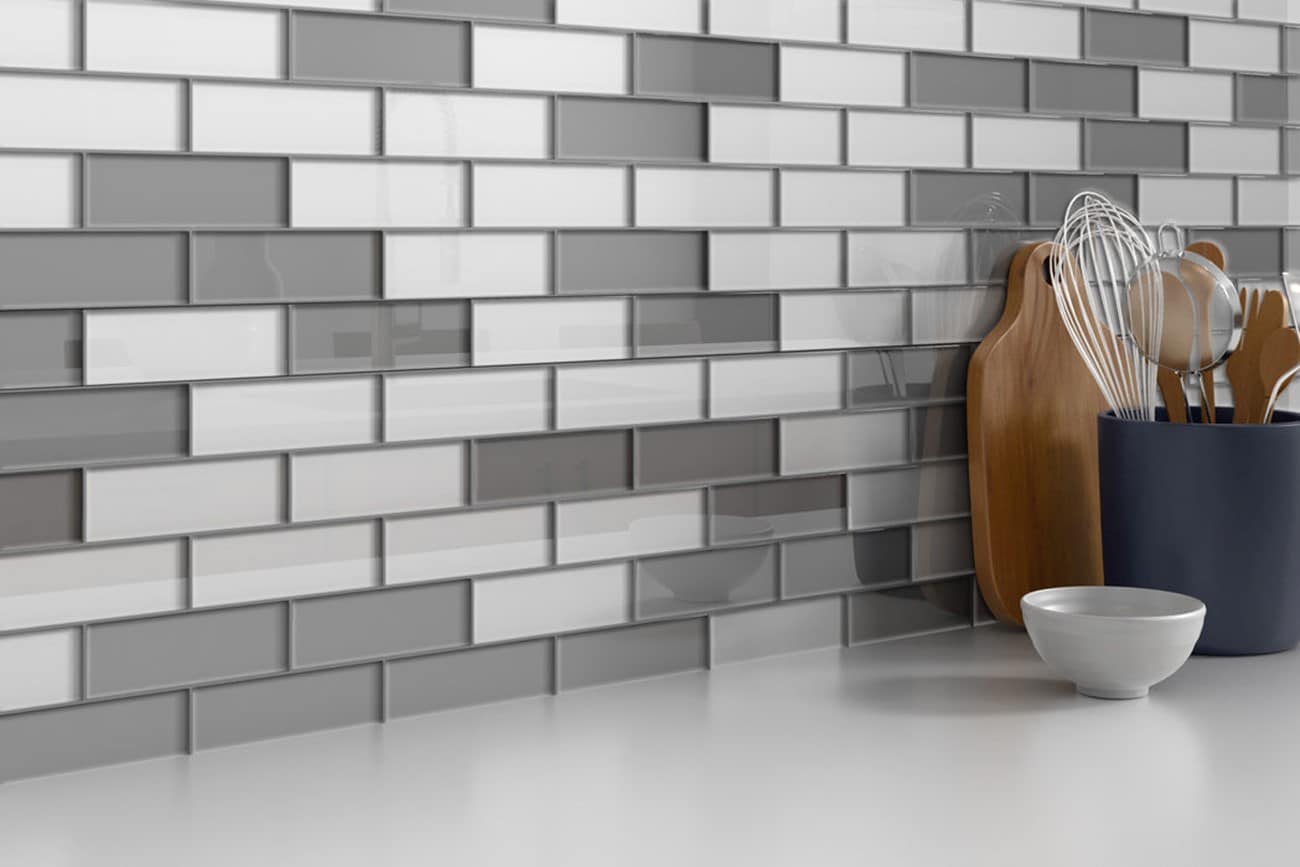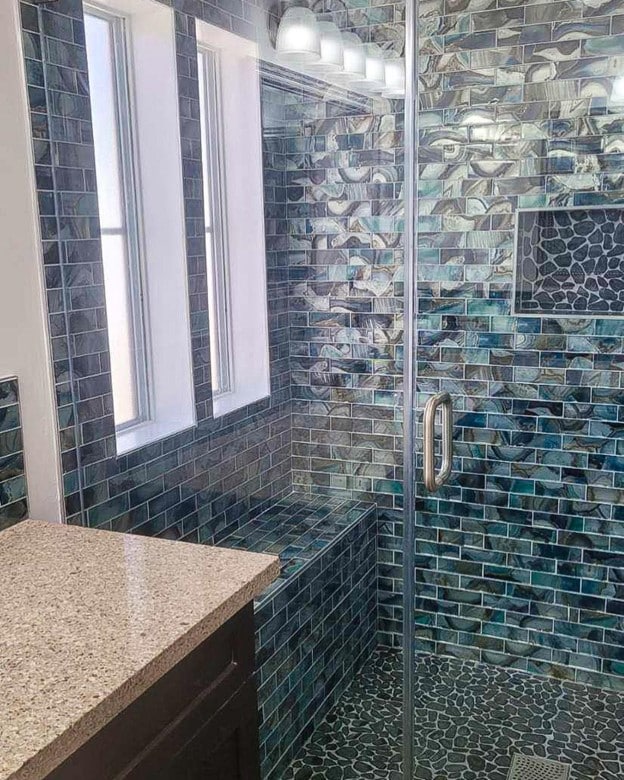If you’re in the market for new tile for your home, you want a product that looks great and matches your unique design style — you also need it to stand the test of time to get the most out of your investment. So, which is the best tile option for style, durability and performance?
The answer might surprise you.
Glass Tile Benefits
Glass tile is an increasingly popular option because of its artistic handcrafted quality and beauty: The translucence of glass tile reflects light to give your space the appearance of being brighter and larger.
Glass tiles are versatile: Glass tiles are available in various shapes, styles, sizes, colors, and finishes, so the design possibilities are seemingly endless. Glass tile feels right at home, from contemporary linear stacks or classic subway installations to transitional mini mosaics.
Emser Tile: Irish™ Glass Mosaic
Are Glass Tiles Durable?
Glass tile is extremely tough and adaptable, making it ideal for use in kitchen and bath applications, as well as outdoor installations where it can withstand the elements.
While glass can be considered a fragile material in some product applications—think windows and lighting fixtures—glass tiles are manufactured to stand up to everyday wear and tear.
Glass tile products are formally tested for durability following the ANSI A137.2 specification, which classifies products based on their method of manufacturing but also their size and durability characteristics.
While different products each have their own test results, glass tiles categorically score high across the board when it comes to the critical durability characteristics:
- Breaking Strength
- Freeze / Thaw
- Scratch Hardness
- Water Absorption
- Thermal Shock Resistance
- Chemical Resistance
- Abrasion Resistance Static Coefficient of Friction
We believe that glass tiles are great for kitchens, bathrooms and other wall applications. Glass tile also works well in outdoor applications.
Do Glass Tiles Break Easily?
When properly installed, glass tile is not susceptible to breaking or cracking more than other ceramic and porcelain tile types. When installed and cared for correctly, glass tiles are highly durable and can last for a long time.
However, glass tiles are also less forgiving when not installed properly, especially when the tile needs to bear weight. For that reason, we suggest working with one of our Floor & Tile professionals to install glass tiles.
Individual glass tiles can be delicate depending on their quality, depth and shape. But once installed, glass tiles are sturdy. They are an excellent choice for shower walls and even shower floors. However, be mindful that glass tiles can scratch, so there might be better options for high-traffic flooring.
What Type of Grout Is Best for Glass Tile?
The type of grout you choose for glass tile is significant. Many grout options are made of sand and other abrasive materials. While your glass tile is durable, it is susceptible to surface scratches, especially from abrasives like sand.
According to home improvement expert Bob Vila, “Epoxy grouts are becoming popular for use with glass tile because of their longevity, strength, and relationship with the glass.” He explains, “Many of these grouts have a chemical composition that resists stains and breakdown and makes them non-porous and non-absorbent.
“When mixed with antimicrobial products such as Microban, epoxy grouts also inhibit the growth of mold or mildew, a common occurrence with regular cement grout.” Vila says that non-absorbent epoxy grouts are a bit more expensive than cement grouts. Still, they pay for themselves over time because they are longer-lasting and create a stronger finished installation.
Grout quality impacts both the durability and the aesthetic of glass tile installations. Most glass tile products are translucent, so the adhesive grout is visible through the tiles — which is why it’s so important that the grout is applied evenly. To help ensure you get both the performance and the appearance you want from your glass tile, go with professional installation.
Is Glass Tile Hard to Maintain?
Glass is one of the easiest tile surfaces to clean. Due to its impervious nature, stains remain on the tile surface, so they can easily be wiped away with minimal effort.
Moreover, because glass is a highly durable, non-porous material, it requires no sealant to maintain its stain-resistant and anti-microbial characteristics — a win for those who dread scrubbing soap scum off shower walls or cleaning grease spatter off the backsplash.
Emser Tile: Edge White
For best results, Emser Tile advises simple and common-sense cleaning methods are best: Avoid using abrasive cleaners or scouring pads to clean glass as they may scratch the surface. In addition to specialty glass tile cleaning solutions available on the market, glass or multi-surface cleaners applied with a soft cloth or paper towels will work well for everyday cleaning. You can also use a homemade glass cleaning solution of equal parts water and vinegar.
When extra attention is needed, wash glass tile surfaces using a mild detergent or degreaser and then rinse with clean water. Dry thoroughly with a clean cloth or paper towel to increase the shine and prevent water spots or streaks.
Emser Tile: H2O™ in Dove Image Source
The Pros and Cons of Glass Tile
A healthy-home choice, glass tiles are resistant to stains mildew and allergens. They’re low-maintenance — and very easy to wipe clean. And their durability is comparable to other wall and flooring materials such as ceramic tile and laminate.
On the upside, Bob Vila hails glass tile for its durability and performance. He explains that glass tile can be just as solid and long-lasting as ceramic tile: “Moisture penetration is the enemy of any tile project since it can spell mold and mildew. There is no such worry with glass tile as long as it is properly installed.”
Beyond its functionality, Sherwin-Williams touts the beauty of glass: “Glass tiles offer a unique look and unmatched shine compared with other materials for floors, walls, and countertops. Translucent tiles can add an unusual effect of depth to surfaces that are unlike any other material.” Glass tile also infuses the rich color into design spaces: You can see the shade through glass versus other materials like ceramic tile.
On the other hand, the shiny surface of glass tiles means that “fingerprints and footprints show up more clearly than on duller surfaces, so more-frequent cleaning may be necessary to maintain that smooth gleam.” And when glass tiles are installed in high-traffic areas, they can get scratched over time. These scratches can be visible against the glossy finish of glass tiles, especially in dark colors.
When using glass tiles on the floor, be mindful that they can be cold underfoot, and their smooth surface can be slick when wet. For a safer shower floor installation, use a heavy grout line (for example, with a mini-mosaic glass tile) to create more grip for sure footing on a wet surface.
MSI Tile: Night Sky Subway Tile 2×6
Glass Tiles Are Friendly on the Environment
Recycled glass tile is an eco-conscious choice for your home living space. Today, many manufacturers offer glass tiles made of recycled materials — these tiles are created using glass products that have been thoroughly cleaned, sorted and then melted down to form new tiles.
But even if the glass tiles you choose are not composed of recycled glass, they are still sustainable: all glass tiles are 100% recyclable at the end of their lifespan. Plus, glass tiles also take about half the energy required to produce ceramic tiles, so you can feel good about being good to the planet while satisfying your design vision.
Shop Glass Tile in Northeast Ohio
If you’re in the Cleveland area and want to browse tile samples for your home improvement project, visit our team at the Dover Flooring & Tile Center in North Olmsted. We not only have a fabulous tile selection, but we can also give you the direction you need to ensure that your tile project is a beautiful success.
The best is yet to come,
Beth Orr









